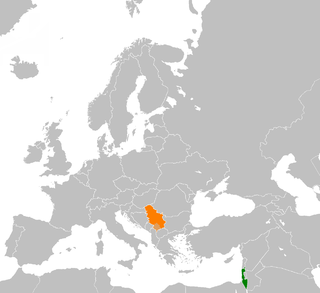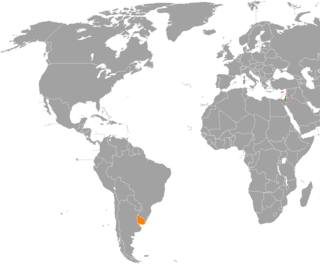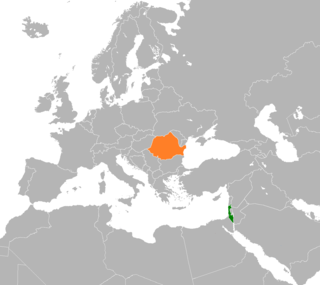 | |
East Timor | Israel |
|---|---|
East Timor-Israel relations refers to diplomatic ties between East Timor and Israel.
 | |
East Timor | Israel |
|---|---|
East Timor-Israel relations refers to diplomatic ties between East Timor and Israel.
East Timor established diplomatic relations with the State of Israel in August 2002. [1] Israel is represented in East Timor through its embassy in Singapore. [2]
President of East Timor, José Ramos-Horta, visited Israel in 2011. [3] He also delivered a lecture to students at the Hebrew University of Jerusalem. [4] While in Israel, Horta met with Israeli president Shimon Peres. [5] East Timor is particularly interested in strategic cooperation with Israel in the spheres of agriculture and naval security. [6]
Sagi Karni is Israel's non resident ambassador to East Timor based in Singapore. [7]

Foreign relations of Israel refers to diplomatic and trade relations between Israel and other countries around the world. Israel has diplomatic ties with 164 of the other 192 UN member states as of December 2020. Israel is a member of the United Nations (UN) and a number of other international organisations. Israel maintains full diplomatic relations with two of its Arab neighbours, Egypt and Jordan, after signing peace treaties in 1979 and 1994 respectively. In 2020, Israel signed agreements establishing diplomatic relations with four Arab League countries, Bahrain, the United Arab Emirates, Sudan and Morocco. As of 2021, Israel had formal diplomatic relations with 168 other countries, while twenty-eight UN member states have either never established, or have broken off diplomatic relations with Israel.

Israel–Nepal relations refer to the bilateral ties between the State of Israel and Nepal. The two countries established diplomatic relations on 1 June 1960, making Nepal the third South Asian state to recognize Israel behind Ceylon and India, and the first South Asian state to establish full bilateral ties with it.

Angola and Israel established diplomatic relations in 1993. In 1995, Israel opened an embassy in Luanda and in 2000, Angola opened an embassy in Tel Aviv.

The diplomatic relations between Israel and Serbia were established on January 31, 1992, when Serbia was part of FR Yugoslavia. Israel has an embassy in Belgrade and Serbia had an embassy in Tel Aviv. Yugoslavia was the second country in Europe to recognize Israel in 1948. The two countries have economic and cultural ties, helped by a sizable community of Jews from the former Yugoslavia in Israel. Serbia agreed to move its embassy to Jerusalem on 4 September 2020 but decided not to after Israeli recognition of Kosovo as a sovereign state.

Israel–Uruguay relations are foreign relations between Israel and Uruguay. Uruguay was the first South American country to recognize Israel.

Chile–Israel relations refers to the bilateral and diplomatic ties between Chile and Israel. Chile recognized Israel's independence in February 1949. Both countries established diplomatic relation on 16 May 1950, with Israel sending their first ambassador on that date and Chile sending their first ambassador on 16 June 1952. Chile has an embassy in Tel Aviv. Israel has an embassy in Santiago.

Israel–Vietnam relations refers to the bilateral relations between the State of Israel and the Socialist Republic of Vietnam. Vietnam and Israel established diplomatic relations on July 12, 1993, followed by Israel opening its resident embassy in Hanoi in December 1993. The current Vietnamese Ambassador to Israel is Lý Đức Trung, who has been assigned since April 2022. Ambassador Lý Đức Trung operates out of the Vietnamese embassy in Tel Aviv. The current Israeli Ambassador to Vietnam is Yaron Mayer, who has been assigned since August 2022. Ambassador Mayer operates out of the Israeli embassy in Hanoi.

Relations between Israel and the Czech Republic, and its predecessor state Czechoslovakia, have varied widely over time. Initially warm, Czechoslovakia-Israel relations deteriorated, and the two countries did not have diplomatic relations during most of the Communist rule in Czechoslovakia. However, after the Velvet Revolution and dissolution of Czechoslovakia the countries re-established contact, and the Czech Republic is now one of Israel's closest allies, frequently demonstrating strong support for Israel at the United Nations and within the European Union.

Israel–Romania relations are foreign relations between Israel and Romania. Both countries established full diplomatic relations on June 11, 1948. Israel has an embassy in Bucharest. Romania has an embassy in Tel Aviv and a general consulate in Haifa, and 2 honorary consulates. The two countries have signed many bilateral treaties and agreements and both countries are full members of the Union for the Mediterranean.

Brazil–Israel relations refers to the bilateral relations between the Federative Republic of Brazil and the State of Israel. Brazil has an embassy in Tel Aviv and an honorary consulate in Haifa. Israel has an embassy in Brasília and a consulate-general in São Paulo. The Brazilian ambassador to Israel is Gerson Menandro Garcia de Freitas. Israel's current ambassador to Brazil is Daniel Zohar Zonshine. Brazil and Israel maintain close political and military ties. The two nations enjoy a degree of arms cooperation. Brazil is a full member state of the International Holocaust Remembrance Alliance, while several Brazilian elected officials participate in the Israel Allies Caucus, a political advocacy organization that mobilizes pro-Israel parliamentarians in governments worldwide.

Relations have existed between Bahrain and Israel since Bahrain achieved its independence in 1971. In recent years, relations between the two countries have been thawing, and the countries agreed to establish diplomatic relations in September 2020. The foreign minister of Bahrain Khalid bin Ahmed Al Khalifa has been quoted saying "Israel is part of the heritage of this whole region, historically. So, the Jewish people have a place amongst us." The common threat of Iran has provided common ground for a thaw in what were once tense relations. Bahrain's foreign policy traditionally supports the creation of an independent Palestinian state.

Brazil–Palestine relations refers to the current and historical bilateral relationship between Brazil and Palestine. On 5 December 2010, Brazil officially recognized the State of Palestine including all of the West Bank and the Gaza Strip, and having Jerusalem as its capital. In 2015, the Embassy of the State of Palestine to Brazil was opened in Brazil's capital, Brasília, and the Brazilian government received an area in Ramallah for installing its diplomatic mission to Palestine.

Political relations between the State of Palestine and the United States have been complex and strained since the 1960s. While the U.S. does not recognize the State of Palestine, it recognizes the Palestine Liberation Organization (PLO) as the legitimate representative entity for the Palestinian people; following the Oslo Accords, it recognized the Palestinian National Authority as the legitimate Palestinian government of the Palestinian territories.

Israel – South Sudan relations refers to the bilateral ties between the State of Israel and the Republic of South Sudan.

The Branch Office of the Embassy of the United States of America in Tel Aviv is part of the diplomatic mission of the United States in the State of Israel. The complex opened in 1966, and is located at 71 HaYarkon Street in Tel Aviv. It served as the United States Embassy until May 14, 2018, when the seat of embassy was relocated to Jerusalem.

Israel–Myanmar relations refer to the bilateral relations between Israel and Myanmar. The two nations established diplomatic ties in 1953. Israel has an embassy in Yangon, and Myanmar has an embassy in Tel Aviv. The Jewish state has a longtime friendship with Myanmar, which was among the first countries in Asia to recognize Israel's independence and establish diplomatic ties with the young state. There is much cooperation between the two countries especially in the fields of agriculture and education. Myanmar Joins Singapore as a one of two Southeast Asian States that do not recognise the State of Palestine.
Sagi Karni is the Ambassador of Israel to Singapore. He was the Ambassador to Angola and non-resident Ambassador to Mozambique and Sao Tome & Principe, beginning in 2008. He was Consul General to Hong Kong and Macau from 2013-2017.
Simona Halperin was the Israeli Ambassador to Singapore and East Timor from 2017 until 2019 when she was replaced by Sagi Karni.,

The Bahrain–Israel normalization agreement, officially Abraham Accords: Declaration of Peace, Cooperation, and Constructive Diplomatic and Friendly Relations is an agreement to normalize diplomatic and other relations between Bahrain and Israel. The agreement was announced by President Donald Trump on September 11, 2020, and followed on from a joint statement, officially referred to as the Abraham Accords, by the United States, Israel and the United Arab Emirates (UAE) on August 13, 2020. It was formally signed on September 15, 2020, at the White House in Washington, D.C., and made Bahrain the fourth Arab state to recognize Israel and the second within a month.

Israel-Liberia relations refer to the bilateral relations between the State of Israel and the Republic of Liberia. Liberia was one of the United Nations member states to vote in favor of establishing a Jewish state in Palestine in 1947. Israel and Liberia established relations in the late 1950s. The administration of William Tolbert severed ties with the Israeli government in 1973 in response to the Yom Kippur War, but they were re-established in 1983 by Samuel Doe, who succeeded Tolbert via coup.